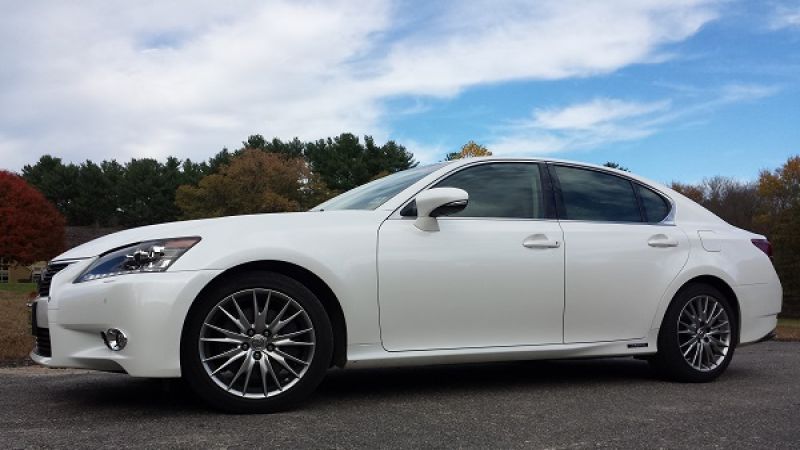My recent test vehicle is the 2015 Lexus GS 450h hybrid. While researching some competitive models to see how its fuel economy stacks up I noticed that the BMW 535d has almost the exact same sticker price when similarly configured and that it too is marketed as a green car alternative. This article will explore how each comes to the green car designation and examine which is a greener car choice. The story will also help explain, to the handful of people that might wonder, why Lexus does not have diesel offerings.
Performance, Cost, Design, and Reliability – BME 535d vs. Lexus GS 450h
Before we go too far, let’s get one thing straight. This Lexus GS 450h is just as fast off the line as the “torquey” BMW 535d. I examined a variety of independent reviews, and both of these vehicles accelerate to 60 mph in about 5.7 seconds. Both are very capable and enjoyable sport sedans of about the same size, and are sold at the same price. The matchup seems more than fair for a comparison of their green credentials.
The BMW 535d employs many of the same fuel-saving measures that gasoline hybrids do. The BMW uses an 8-speed ZF transmission tuned for fuel efficiency with many more gears than would have been considered sane a few years back. It has the stop-start function first pioneered on hybrids, and its tires, alternator, steering system, and other components all have changed to be the most fuel efficient they can be. If, in your mind, you see the BMW 535d as an old-school performance sedan with a transplanted diesel motor you are way off the mark.
In terms of cost, both are about $70k with the luxury items expected in a car like this, have included maintenance and have long warranties. Diesel engines have a great reputation for reliability, but so do Lexus hybrids, which come with added warranty extesions for the hybrid parts. Couple this with the reality that the buyer of $70K sedan is not going to worry about small costs, and is very likely to either lease or buy certified, pre-owned, and the whole cost of ownership thing is not really worth arguing like it is in the affordable small and mid-size car classes.
2015 BMW 535d – MPG, CO2, and Emissions
The BMW 535d has an EPA estimated mileage of 30 MPG combined, 26 city and 38 highway. It will consume 12.7 barrels of oil per year. Fueleconomy.gov says that the CO2 per mile of this sedan is 334 grams. Its smog rating is 7 out of 10 on the EPA’s scale. Its annual fuel cost according to EPA’s site is $1,800.
These are respectable numbers, but it should be noted that a gasoline-powered Mazda6 is about the same size, and can beat every one of these numbers. The difference in these two is strictly straight-line performance. On a green car scale without factoring in speed, the BMW 535d is not even as “green” as a mainstream gasoline powered car its size.
2015 Lexus GS 450h
The Lexus GS 450h has an EPA estimated mileage of 31 MPG combined, 29 MPG city, and 34 MPG highway. It produces just 283 grams per mile of CO2 and has a smog rating of 8 out of 10 (the higher the number, the cleaner). EPA says that it will cost about $1,650 to fuel the vehicle per year. It will consume 10.6 barrels of oil per year.
The Lexus GS 450h is much closer to the Mazda6 benchmark than the BMW. The Mazda6 consumes 10.3 barrels of oil, creates 275 grams per mile of CO2, ties the Lexus with 8 out of 10 on the smog scale, and has a combined EPA mileage of 32 MPG. The gasoline powered Mazda6 is still a bit greener than the Lexus.
Lexus GS 450h Gasoline Hybrid Much Greener than BMW 535d Diesel
In summary, the Lexus matches the BMW in performance, yet gets 3% better fuel efficiency. Its fuel economy is 8.3% better (because of the fuel cost disadvantage of diesel), and it takes 17% more crude oil per year to move the BMW around. In terms of CO2, the dreaded “greenhouse gas”, the Lexus produces 15% less. The Lexus also has a 13% better smog rating than the BMW 535d. The Lexus walks away with the win having bested the BMW diesel in every measurable green car category while coming in at the same price and performance level.
I have not tested the BMW 535d, but my mileage over about 300 miles of mixed suburban and highway driving in the Lexus GS 450h is 36 MPG. Yes, gasoline powered cars often beat their MPG estimates, just like diesels are reported to do by owners. In fact, I have never tested any gasoline powered car that did not do better than its EPA estimate.
In the affordable car ranks, those cars which compete with the Toyota Corolla LE Eco and Mazda6, gasoline powered cars with no hybrid system are within 1 or 2 MPG of the combined MPG of the best diesels in the market (which basically means Volkswagen). Despite diesel lobbyists' claims to the contrary, the gasoline cars in this segment produce less CO2. In the ranks of the cars that sell the most in the US diesel cannot really be considered a green choice. In the premium ranks where performance counts, diesel cannot match the modern gasoline hybrids selling at the same price point.
This fact is the reason that Lexus does not market a diesel car in North America, and why even in Europe, where diesel long enjoyed artificial price supports making it much less expensive than gasoline, things are changing. As European regulators begin to punish CO2 production and smog production more, gasoline hybrids have the edge on all options that do not have a plug. It should also be noted that as battery technology and plug-in costs improve, adding a plug-in option to gasoline hybrids becomes easier and easier, while diesels have really no place left to go.
Related Stories:
Mazda reported to be working on diesel hybrids
Why are there no diesel hybrids?
2013 Jetta Hybrid bests Jetta TDI Diesel in cost of ownership comparison
Study finds Lexus about twice as dependable as BMW
Set Torque News as Preferred Source on Google












Comments
Great. Thanks John.
Permalink
Great. Thanks John.
Try testing the hybrid in a
Permalink
Try testing the hybrid in a demanding situation such as on a track, sprinting through mountains, or pulling a trailer (which the BMW is rated for in Europe but not USA). The hybrid battery will quite likely be come depleted under those conditions, leaving a huge hole in the torque curve. While most US owners will do few or none of these things, it's a meaningful difference.
The diesel BMW is also quite happy with tuning for more power, and there is even a provider that seamlessly replaces the warranty should the tuning cause issues (they work with BMW and can unlock the ECU). BMW themselves offer the same engine in forms of up to 380hp, so the concept is already proven.
Try adding 150 hp to the hybrid Lexus.
The Lexus of course will spend less time on the dealer's lift, and be far more economical to own out-of-warranty.
That Lexus is somewhat like the 3 series
Good feedback, but I think
Permalink
In reply to Try testing the hybrid in a by DrivingBy (not verified)
Good feedback, but I think you are really stretching to find a way for the BWM to come out ahead here. The Lexus V6 engine already has 306 hp before it adds the hybrid drive. I have driven the gas-only GS 350 on-track and it does quite well. Trailer ratings? More importantly, the story is primarily about which vehicle is more green in its US market form. No, this Lexus GS in not "somewhat like the BMW 3-Series." It is very much like the BMW 5-Series. Lexus has a car the exact dimensions of the 3-series and both Car and Driver and Road and track chose the Lexus over the 3-Series in comparison testing. http://www.torquenews.com/1083/2014-lexus-350-beats-bmw-335i-comparison-test-again Please don't let my continuation of the dialogue give you the impression we don't appreciate your comments. We do. Thank you.
If emmissions matter you won
Permalink
If emmissions matter you won't buy either of the two cars. If style and raw power matters then i would never swap a bmw with a lexus. It's hard to believe that you looked at the entire spectrum of what the bmw can offer. Fuerther, comparing apples with apples would help in this case too.
Btw, i'm happy to see that you are happy with your lexus :-)
Spoken like a true BMWphile
Permalink
In reply to If emmissions matter you won by Roger sallenbach (not verified)
Spoken like a true BMWphile When facts and figures get in the way of one's beliefs, choose to ignore the facts in order to hold on to one's illusions. :)
Where does the battery
Permalink
Where does the battery disposal stand in the green issue?
Excellent question, but I
Permalink
In reply to Where does the battery by Rick (not verified)
Excellent question, but I have to say the auto industry is past that. They are so crazy about the topic that they are all bragging about how they are zero landfill, water recycling, LEED certified, and have moved on to green help with their independent dealers. Like CFLs and other hazardous green items all the Mfgs can effectively, and cleanly recycle the batteries they use in their green-machines.
Agreed...This always just
Permalink
In reply to Where does the battery by Rick (not verified)
Agreed...This always just gets shoved to the side that manufacturers will take care of the recycling. How about the overall carbon footprint created to manufacture battery materials worldwide to make these vehicles. (not mentioned in the article) Neither are truly a solution to the growing worldwide fuel concerns, but the author's obvious bias for hybrids and especially Lexus makes it an article that inspires frustration regarding new technologies. Show both sides, positive and negative. Even with the recent articles regarding VW/Audi allegedly manipulating the emissions systems I can already hear the author finding a way to pin the demise of VW/Audi on diesel and for the author the solution will be buy a Lexus Hybrid. Its a childish approach to Automotive journalism. 'Buy what I like, b/c I said so.' Do everyone a favor before you write your next article. Test both vehicles, try (for gods sake) testing similar models within different brands and proofread your article before pressing submit. "BME BWM BMW 335d 535d.(all of these were in the article)" Which is it? Its the same type of mistake that many Automotive journalists make when a new Corvette comes out and it becomes "My God the new Stingray is a Porsche/Ferrari/Lambo killer." Its got to be frustrating for Corvette when they produce their cars to have automotive journalists do nothing but utilize another company as the benchmark and not their previous models of vehicles. Compare and contrast is good, but when a month later Porsche/Ferrari/Lambo have redeveloped something in their car and it now beats the Corvette, you never hear the term 'Corvette Killer' Why?? Because the author has already surmised that the Corvette is the inferior vehicle. Unless you work for a manufacturer write pros and cons of both vehicles not just which one you would drive. Let me weigh the facts.
Note the title. This is not
Permalink
In reply to Agreed...This always just by Get it Right (not verified)
Note the title. This is not a review or a report claiming a test was done. It is a comparison of the green credentials of two models representing different technology. Both vehicles are marketed as "Clean and green" by their companies. All the writers at Torque News, not just me, do full test-drive comparisons where we do not pick a winner, but let the reader decide what they might prefer while suggesting what the strengths of each are. Testing is done in the real-world for a full week. We do them frequently. As far as I know we are one of the only outlets that does this.
- Here is the most recent one: http://www.torquenews.com/1083/2016-subaru-forester-25i-premium-vs-toyota-rav-4-xle-which-buy
-Here is an example where I give the nod to the Golf Diesel in most of the sections:
http://www.torquenews.com/1083/2015-volkswagen-golf-tdi-vs-toyota-corolla-le-eco-efficiency-meets-economy
- Here is an example with a winter twist: http://www.torquenews.com/1083/winter-comparison-2015-mazda3-grand-touring-vs-subaru-impreza-20i-limited
- Here is an example by the editor of the site who came up with the format: http://www.torquenews.com/106/which-buy-2015-honda-fit-or-2015-fiat-500-sport
BMW does not offer a 335d for
Permalink
BMW does not offer a 335d for the US market for the 2015 model year. They do offer a 535d and a 328d, both of which are very different creatures from both each other and from the 335d offered in Europe and previously in the US (2009-2011). Presuming you meant 535d, EPA estimates routinely over-predict real-world mileage on hybrids and under-predict real-world mileage on diesels, so I'm not sure that's a very good baseline for comparison since the difference you mention is well within the margin of error. Also, since this is a site called "torquenews", I think it's worth mentioning that the 535d has upwards of 413 ft-lbs of it, where the Lexus, decidedly, does not. Your horse may be high, but not so high as you think.
Michael, thank you so much
Permalink
In reply to BMW does not offer a 335d for by Michael L. (not verified)
Michael, thank you so much for pointing out my model number mistake. I did mean to type 535, and I fixed it just now. I can't agree with you that the EPA is wrong about hybrids's fuel economy. I've tested too many to know otherwise. I have beaten the highway numbers with a golf diesel and there is truth to your point about some diesel cars exceeding their EPA numbers. -True that diesels have good torque, but so do V6 gas engines with supplemental electric motors. Both cars have an abundance of torque. -Coincidental to your comment today, I am testing a Jeep Grand Cherokee diesel for the second week this winter. Today I filled up and the cost of regular unleaded was 2.37 per gallon. Diesel is 3.39. That shocked me.
This is funny. such a tool.
Permalink
This is funny. such a tool. anyone who writes a clearly biased from the getgo article should collect all the facts. You give a bad name to being an editor. First off, you state you haven't driven the BMW. don't you think that's part of your due dill as you point out what you get in your own car stating your mileage is higher in your car than is advertised? Don't you think the same would be true for the BMW? Wait, i have something for you, though I don't own a 535d with the 8 speed tranny and the start stop tech, i DO own a 335d that has a 6 speed tranny and no start stop tech, so despite the fact that the 535d carries around more pounds than the 335d, the 335d doesn't have the newer tech and would probably would say that the 535d would still do better economywise than the 335d. I have the pictures to prove this. 6.6 l/100 (life of vehicle) here in canada...so in MPG (im gal) its 35.6 MPG which includes winter driving which sucks back more fuel. (my last tank and this was 80% city i did 6.2 l/100 which is 38 mpg) So it is safe to assume that the 535d will also have better than stated mileage. Also, the cost of fuel crap is a BS. Tell me do you put regular or premium into your nice 450h? I would imagine its premium which is COMPARABLE in price with diesel. So all in I would say diesel has the advantage. Get your facts straight next time and do your homework before you puke on the page.
Victor, you make a good point
Permalink
In reply to This is funny. such a tool. by VICTOR (not verified)
Victor, you make a good point about the cost of fuel comparison. Just for clarification, I don't "have a Lexus GS." It was a media test vehicle. The point of the story is a green car comparison of two similarly sized vehicles in the same price class. Your comment says the story is off base because you own a different size car, with a transmission not offered I the BMW I wrote about. Tell me where in the story my analysis of the green car attributes of the cars in the story are off base. I agree with you that on the highway the BMW may get better fuel economy than EPA estimates. I have seen that in test vehicles. However, my testing of diesel cars this year (3) shows that they don't do better than the EPAs combined fuel economy. That is a general observation.
I thank you for some of the
Permalink
In reply to Victor, you make a good point by John Goreham
I thank you for some of the clarification in your article. That said, it would have been useful to indicate that though you haven't driven the 535d specifically, you have driven diesel vehicles and they posted off numbers...that would have added some depth to the article and shown some attempt at research. that said, the tone you write with has a very biased tone, as if you were validating the hypothesis you used when you began writing the article. Believe me, I know what that looks like as I get criticized when I began writing many moons ago. I draw the comparison between my own vehicle and the 535d because i am short two gears and don't have the fancy start stop tech. I am pointing out that even though my car doesn't weigh as much as the 535d it is still severely handicapped in terms of it's ability to return top EPA for the above state reasons. I am making the point that i still get 38 MPG even with only about 20% of it being highway. Call that a combined city/highway tank and you get numbers better than a truly representative "combined" tank.
As a further point, I have driven multiple diesel vehicles over the years in different places on earth, and I have always managed to match or exceed the stated estimated mileage, where as in the half dozen hybrid cars I can not say the same, its been lower. Actually, there has been an exception, a 2013 camary.
I stopped reading after: I
Permalink
I stopped reading after: I have not tested the BMW 535d, but my mileage over about 300 miles of mixed suburban and highway driving in the Lexus GS 450h is 36 times
What a load of crap you state here... You're selling the goodness of petrol by actually compensating it with electricity. Please go learn some real physics before you post on internet. I have read a lot of crap but you are the top! I'm not a bmw owner, but i am a physicist, so ... Please, get educated before you post. I will be happy to explain you ALL the errors in your logic
Thanks for wasting my time, and corrupting other peoples minds with brainless rants
Well, you got through most of
Permalink
In reply to I stopped reading after: I by Rik (not verified)
Well, you got through most of the story if you got to the part you quoted. The majority of readers of of on-line publications only read about 100-200 words (we track that carefully with G-Analytics). I'm not a physicist, but I have a degree in mechanical engineering. Maybe I will be able to keep up. If you have the time, please do explain the mistakes in the logic in this comparison of two vehicles' green credentials.